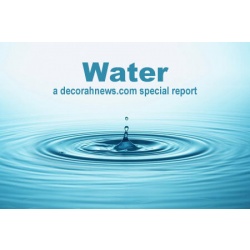
"Water: A decorahnews.com special report"
A lawsuit over high nitrate levels in the Raccoon River has pitted the Des Moines Water Works (DMWW) against three central Iowa counties and has sparked debates about water quality throughout the rest of the state.
The suit, which is scheduled to go to trial in June of 2017, will determine whether or not the drainage districts of Buena Vista, Sac and Calhoun counties can be sued for damages under the Iowa Clean Water Act.
Agriculture has long been exempt from storm drainage and non-point source pollution, but DMWW is contending that underground drainage tiles in agricultural fields have led to point source pollution of the Raccoon River, and these counties are liable to pay damages for clean-up.
DMWW CEO and General Manager Bill Stowe says that the utility spent around $1.5 million dollars in 2015 to remove excess nitrates in order to comply with federal drinking water standards. He speculates that it will cost well over $50 million over the next few years.
Since the Iowa Soybean Association is backing the counties while environmental groups are backing the DMWW, some have called the suit a fight between rural and urban, including Iowa Governor Terry Branstad who said that "Des Moines has declared war on rural Iowa." Others, including Stowe, maintain, "Water quality is a public health issue and not an economic inconvenience or culture clash."
Researchers in Northeast Iowa agree that while the fight over how to protect water quality is taking place in another part of the state, the issue is of special concern in the Driftless Region.
According to Luther's Professor of Biology Jodi Enos-Berlage, who conducts research on a watershed north of Decorah, the underground landscape of northeast Iowa is "like Swiss cheese." Known scientifically as "Karst Topography," this region has an incredibly porous underground landscape created by the dissolution of the soluble limestone rock bed.
Due to this unique topography, which is characterized by sinkholes, underground caves, streams and springs, water is able to flow more freely once it seeps into the ground than it can in other places in the state.
Turkey River Watershed planner Ross Evelsizer agrees with Enos-Berlage and further points out how this area of the state must be very careful about how is interacting with its surface waters.
"In western Iowa, it could take weeks for the surface water to trickle down to aquifers underground," Evelsizer said. "Here in Northeast Iowa, we're talking a matter of days, and in some cases, a matter of hours. That's a significant increase."
As the Iowa Supreme Court prepares to make a monumental decision regarding water quality for the state, and possibly for the rest of the nation, this series will explore the issues of water quality as they relate to Northeast Iowa, and attempt to educate the public, examining this issue through its many different lenses, including ecology, the agribusiness, politics and socioeconomics.
Site designed and maintained by Iroc Web Design Services©.
Your Small Business Web Design Solutions.™


